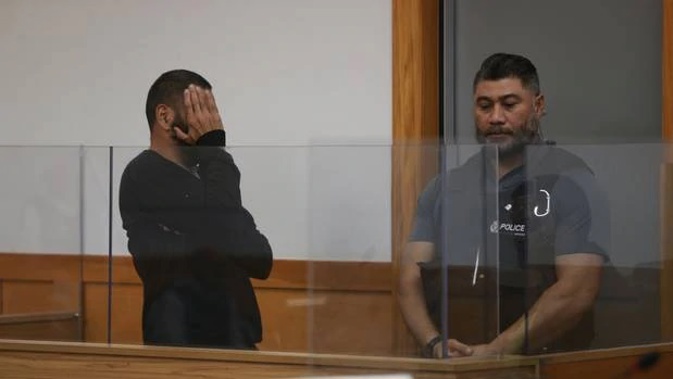
A New Zealand killer who escaped justice for nearly 20 years told his sister he "should have done the right thing a long time ago" and confessed to his crime rather than go to trial in Australia, it can now be revealed.
Paul Beveridge Maroroa was linked to a South Australian killing after his DNA was collected in July, 2017, when he was arrested for a minor crime - his first - in New Zealand.
The Piha resident was extradited from New Zealand to Australia accused of murdering Robert Sabeckis.
The 42-year-old was shot dead on January 13, 2000 in a carpark in Maslin Beach, a southern coastal suburb of Adelaide.
South Australian Police alleged the shooter drove off in Sabeckis' vehicle, which was then found crashed near the crime scene.
The assailant was seen running from the vehicle across paddocks and police found a sawn-off shotgun and jacket in the area.
The shotgun and another firearm, were stolen during a break-in at a house just days before Sabeckis was murdered.
The house was then burned down, destroying potential forensic evidence, but DNA believed to belong to the killer was taken from several items.
When the DNA search request in New Zealand came back with a match it was the first breakthrough in the cold case killing.
During pre-trial legal argument, the Australian Supreme Court heard an audio recording of a phone call Maroroa made, after his arrest in Auckland, from Port Augusta Prison.
In the call, Maroroa – who was on Friday convicted of the manslaughter of Sabeckis – told his sister he regretted having pleaded not guilty two days earlier.
"I should have done the right thing a long time ago," he said.
"A good lawyer would have told me to plead guilty and get a (sentencing) discount … it's all too late.
"I keep making these mistakes and realising them afterwards … I just wish I could get something right, you know? "I've got to start thinking for myself."
On Friday, a jury of five men and seven women took five hours to find Maroroa not guilty of murdering Sabeckis.
They instead found him guilty of the lesser, alternate charge of manslaughter.
By its verdict, the jury did not reject Maroroa's claims he and Sabeckis had engaged in a life-and-death struggle over a stolen shotgun at Maslin Beach on January 13, 2000.
The verdict brings to an end 19 years of mystery over the long-unsolved case, which was not cracked until a the cold-hit DNA match linked Maroroa to the crime.
Prior to that match, SA Police had said they had "no suspects" in the murder.
Maroroa admitted shooting but denied murdering Sabeckis with a sawn-off shotgun.
Prosecutors alleged he "hunted down" and "gunned down" his victim, then further "humiliated" him by striking him with the weapon and pulling down his underpants.
Maroroa, however, said he was delivering the gun to Sabeckis on the orders of drug dealers, only to be attacked himself.
He claimed he fired the shotgun in self-defence because Sabeckis intended to rape and then murder him – a version of events rejected by prosecutors.
/arc-anglerfish-syd-prod-nzme.s3.amazonaws.com/public/2GR4NTL7C5AS3DPMZQK6I2WNLQ.jpg)
Robert Sabeckis was murdered in South Australia in 2000. Photo / Supplied
Pre-trial argument also centred on Maroroa's movements after the killing.
The court was told Sabeckis died on January 13 and that, by January 21, police had gathered much of the evidence in the case.
On January 28, Maroroa visited the Christies Beach Police Station and reported his bag – containing his passport – had been "stolen in Alice Springs".
That, prosecutors asserted, was a lie designed to create a false alibi around his possessions.
They said it also allowed him to leave Australia on April 29 and never return – not even for his mother's funeral – until his arrest and the DNA match.
On Friday, Justice Sam Doyle remanded Maroroa in custody for sentencing submissions in February.
Under state law, the maximum penalty for manslaughter is life imprisonment – however, unlike murder, there is no minimum penalty.
Outside court, Sabeckis' niece Vilija said her family was pleased Maroroa had been "brought to account".
"The reason behind why my uncle was killed may never be known," she said.
"This verdict has brought justice in this matter and offers some comfort to our family, his friends and the Lithuanian community as well."
She thanked SA Police for continuing to investigate the case throughout the decades.
"Robert is still a very much loved and missed member of our family," she said.
"I hope that he can now rest in peace."
Take your Radio, Podcasts and Music with you









